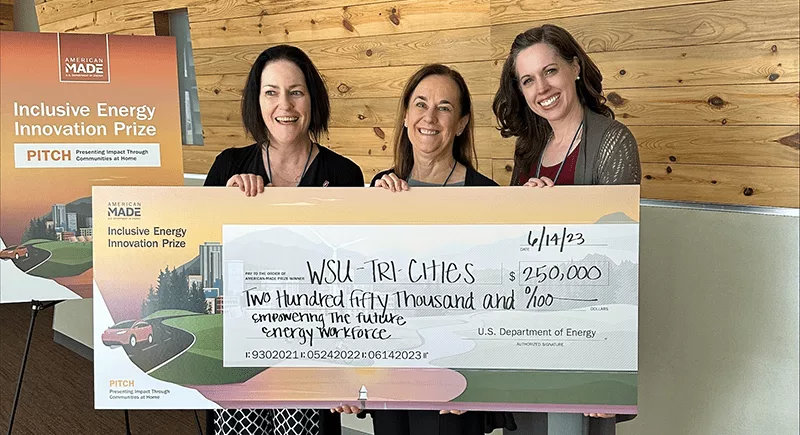
Home » New WSU Tri-Cities program to empower students interested in clean energy
New WSU Tri-Cities program to empower students interested in clean energy

Washington State University Tri-Cities was named a grand prize in the U.S. Department of Energy’s Inclusive Energy Innovation contest, an honor that came with a $250,000 check. Pictured are the WSU Tri-Cities team behind the win, including, from left, Kate McAteer, vice chancellor for academic and student affairs; Chancellor Sandra Haynes; and Jillian Cadwell, research associate in the School of Engineering and Applied Sciences.
WSU Tri-CitiesDecember 13, 2023
Jillian Cadwell knows what it’s like to study and work in a field where she stands out.
“Being a woman in engineering, I’m acutely aware of being underrepresented in STEM,” she said.
That awareness has inspired her research, and it helped inspire a new program at Washington State University Tri-Cities that’s empowering students – many of whom are underrepresented themselves – to explore careers in clean energy.
Cadwell, a research associate in the School of Engineering and Applied Sciences at the Richland campus, is part of the team behind WSU Tri-Cities’ recent triumph in the U.S. Department of Energy’s Inclusive Energy Innovation contest. The university was one of six organizations from across the country chosen as a grand prize winner, an honor that came with a $250,000 check.
Combined with a prize from an earlier round, that brings the university’s total winnings to $450,000.
Cadwell is thrilled by the win, and more importantly by the good it will do for students – and for the Tri-Cities community and beyond. The program includes an ambassador network that connects students with mentors, as well as the development of an energy and sustainability certificate that will help students on the path to future careers. The idea behind the program is to empower students to bring their unique backgrounds and expertise to clean energy and climate innovation, Cadwell said.
“I think the most important thing, to me, is that students have the opportunity to be a part of the energy sector in a place where there are so many different kinds of jobs available, not just STEM-related jobs, but in marketing and communications, for example. It really runs the gamut. And we need all types of people from a lot of different backgrounds to make the industry really shine,” she said.
“The Inclusive Energy Innovation Prize is central to the campus strategy of serving our students, half of whom are students of color and first generation, by preparing them for jobs in a clean energy economy and addressing environmental justice issues in disadvantaged communities,” said WSU Tri-Cities Chancellor Sandra Haynes in a statement when the grand prize was announced.
“This strategy is rooted in the campus and region’s vision for leadership in a decarbonized future and is a key part of the new Institute for Northwest Energy Futures, which is focused on a systems integration view of clean energy. The prize will enable this work to be fully integrated into our curriculum, serving students and their communities well into the future,” she said in the statement.
The Clean Energy Ambassadors Network, or CEAN, kicked off earlier this year with an inaugural group of students. About 35 students worked with industry mentors from organizations such as Energy Northwest and Pacific Northwest National Laboratory on projects dealing with topics from the potential of offshore wind energy to 3D printing of carbon-neutral modular housing to K-12 access to clean energy education, internships, opportunities and awareness. They presented the projects at a symposium.
“With climate change being a prevalent topic, more than ever, I wish to collaborate with a like-minded yet diverse group of people on the matter. The opportunity being here in my home, the Tri-Cities, also motivated me to join since I want to become a part of the Tri-Cities legacy as a frontier in renewable energy,” one student ambassador wrote in a testimonial about the program.
The energy and sustainability certificate is in development. It will be structured similarly to the global leadership certificate that already is in place at WSU Tri-Cities.
Cadwell said the idea is that it can be duplicated at other WSU campuses.
She’s excited about the support the program has received and the community it’s already fostering on campus. And she’s excited about the continued growth.
“This is about helping students leverage opportunities and feel like they’re part of something, like they’re part of a network, like they belong on their path and have support as they go,” Cadwell said. “There will always be roadblocks and barriers but if we can identify those common ones and highlight the ways that we can navigate them together, I think it’s going to help students succeed.”
Education & Training Energy
Related Articles





